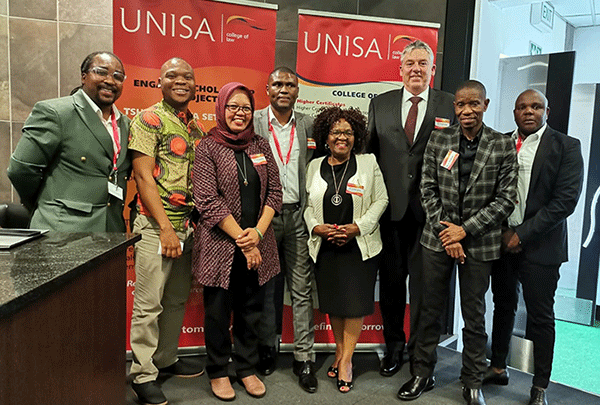College of Law
Tshokollo ya Setšhabeng: Reintegration of ex-offenders in society
Unisa's College of Law (CLAW) recently launched its community engagement scholarship project, Tshokollo ya Setšhabeng.

Prof Ephraim Sibanyoni, Macdonald Rammala, Prof Amira Paripurna, Yoliswa Keswa, Prof Francois Louw, Dr Lebogang Morodi and Prof Phumudzo Muthapuli
The Tshokollo ya Setšhabeng engaged scholarship (community engagement) project is an interdisciplinary group that brings together developing and established scholars, community corrections practitioners, offenders (parolees and probationers), ex-offenders and community members. The project involves multidisciplinary researchers from the Schools of Criminal Justice and Law. It focuses on critical issues relating to the social reintegration of offenders into communities, the community corrections environment and recidivism. The project aims to establish strong relationships with communities and eliminate the stigmatisation of offenders through restorative community service while also focusing on enhancing offender employability and skills development.
In his opening address, Dr Lebogang Morodi, Director of the School of Criminal Justice, emphasised the importance of partnerships and collaborations in dealing with the social ills ravaging communities. He called communities essential stakeholders with the vantage point to assist universities and other knowledge production markets in their quest for curriculum transformation. Morodi encouraged the project leaders of Tshokollo ya Setšhabeng to develop a short learning programme (SLP) in the niche areas of feminism, womanist and student support and co-curricular activities.
Partnerships and collaborations
CLAW is working in partnership with the Department of Correctional Services (DCS) as a key stakeholder in the project. It intends to include two non-governmental organisations (NGOs) that are also key in the rehabilitation and reintegration of ex-offenders in communities: the Morongwa Foundation and Imbokodo Support for Ex-Offenders. Representatives from the DCS, CLAW and the respective NGOs graced the launch. Yoliswa Keswa, the founder of Imbokodo Support for the Ex-Offenders, emphasised the importance of universities' role in rehabilitating and reintegrating parolees and ex-offenders.
Experiences from Indonesia
Prof Amira Paripurna (PhD), an Assistant Professor from the University of Airlangga in Indonesia, was the main speaker at the launch. She detailed the prison experiences, rehabilitation and reintegration of ex-offenders in Indonesia, her home country. Notably, she mentioned that in Indonesia, the correctional facilities are overcrowded at double the allocated capacity, with 246 389 offenders crowded into facilities meant to accommodate 123 025 people. She highlighted the consequences of prison overcrowding in Indonesia, which apply to the South African context:
- Negative impact on rehabilitation: Overcrowding can hinder the rehabilitation of inmates, as it may be difficult to provide individualised treatment and counselling in crowded conditions. This can also hinder efforts to reduce reoffending rates.
- Limited access to rehabilitation programmes: Overcrowded prisons may struggle to provide inmates with access to essential rehabilitation and educational programmes. These programmes are crucial for reducing recidivism and helping inmates reintegrate into society upon release.
- Public safety concerns: Overcrowded prisons may release inmates early to alleviate the population pressure, potentially leading to concerns about public safety if those released are not adequately prepared for reintegration into society.
Newsletter
The project also launched its bi-annual newsletter to educate communities about the importance of the rehabilitation and integration of ex-offenders in communities.
Click here to see the first issue of the newsletter.
#Unisa150
* By Ngwako Mokgotho, Communications and Marketing Specialist, College of Law
Publish date: 2023/10/10

 Unisa co-hosts G20 community outreach in the Eastern Cape
Unisa co-hosts G20 community outreach in the Eastern Cape
 Unisans gain membership of prestigious science academies
Unisans gain membership of prestigious science academies
 Advocating for disability transformation through servant leadership
Advocating for disability transformation through servant leadership
 Unisa Press continues to illuminate the publishing space
Unisa Press continues to illuminate the publishing space